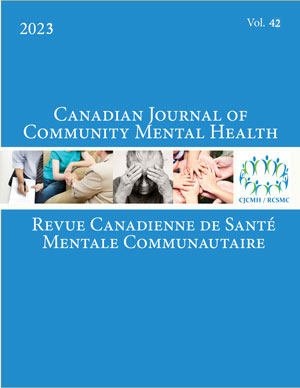Volume 39 • Number 4 • December 2020
SPECIAL ISSUE ON PRIMARY MENTAL HEALTH CARE
Editorial
Articles
OPEN ACCESS
During the period 2010–2011, when the At Home project was conducted, a questionnaire was sent to 420 non-governmental organization (NGO) key managers in six Canadian cities to enquire about their collaboration with public services and their perspective on the services for homeless people with serious mental illness (SMI). NGOs constituted a dense network of collaboration among themselves. With regard to public services, housing and shelters were two services that NGOs had frequent contact with, followed by the healthcare addiction sectors and, to a lesser extent, social service and the justice sectors. Education and employment were both located in the network periphery. In general, NGOs viewed housing availability and accessibility to health services as largely unsatisfactory. They called for better public support, coordination, and funding.
OPEN ACCESS
Youth homelessness is a complex psychosocial problem. It refers to the experience of young people who live without their parents or legal guardians and who do not have the means or the capacity to reside in a stable, secure, and permanent place. This exploratory study sought to examine the mental health and suicidal behaviour of 76 homeless Québec adolescents as part of a reflection on the mission of primary healthcare. Note that these adolescents are mostly in the first segment of the homelessness continuum and have voluntarily left their homes because of personal and family difficulties. These 43 girls and 33 boys aged 12 to 19 living temporarily in shelters completed a semi-structured interview and self-administered questionnaires regarding stressful events, psychosocial stress, and mental health. Of these, 38 reported suicidal behaviour, including attempted suicide in 19 cases. The results show that these young people exemplify a high degree of suffering and multiple problems. Evidence indicates that lost relationships and academic problems rooted in attention deficit/hyperactivity disorder are linked to suicidal behaviour. Finally, non-productive coping strategies centred on somatization and little reassurance of worth provided by the social support network are associated with suicidal behaviour. Caregivers in temporary shelters should look out for these factors and refer vulnerable youth to primarycare mental health professionals.
OPEN ACCESS
Cette étude fait une recension des pratiques éducatives déclarées en milieu scolaire québécois auprès des élèves présentant un syndrome de la Tourette. Le sentiment de compétence des intervenant(e)s et leur perception de l’efficacité des interventions sont aussi évalués. Quarante-quatre participant(e)s ont répondu à un questionnaire en ligne. Les résultats montrent que la gestion des tics est moins souvent rapportée que d’autres types d’intervention, comme la gestion de l’hyperactivité et de l’opposition. Les intervenant(e)s se sentent majoritairement compétent(e)s et considèrent que les interventions appliquées sont globalement efficaces. Cet article permet de mieux soutenir les intervenant(e)s et d’identifier ce qui favorise la réussite éducative de ces élèves.
OPEN ACCESS
Disturbances in physical self-perceptions (PSP) can lead to inappropriate attitudes and eating behaviours (IAEB) including eating disorders (ED) and obesity. This exploratory study assesses the effects of a blind integrated prevention program—the SILENCE Program—with high school students. No significant effect of the SILENCE Program on the IAEB of the 61 adolescents was observed between pre- and post-test, but a positive evolution of specific PSP components (global self-esteem, perceived physical appearance, etc.) during 14 consecutive weeks was demonstrated compared to an ED-only program and the control condition. Promising avenues for integrated prevention programs (like SILENCE Program) are discussed.
OPEN ACCESS
In most developed countries, health systems are attempting to compensate for underuse scientific evidence and its integration into healthcare services and practices. This qualitative study aimed to identify perceived benefits of a knowledge translation program implemented within mental health community services ((At your fingertips, Quebec, 2016-2018)). Results suggests that the production of a collaborative platform composed of a variety of activities and techno-educational tools, derived from integrated knowledge, facilitates the uptake by professionals in a context of reflective practices. Dissemination of these tools through technology of information and communication provides access to best recovery-oriented practices at your fingertips.










